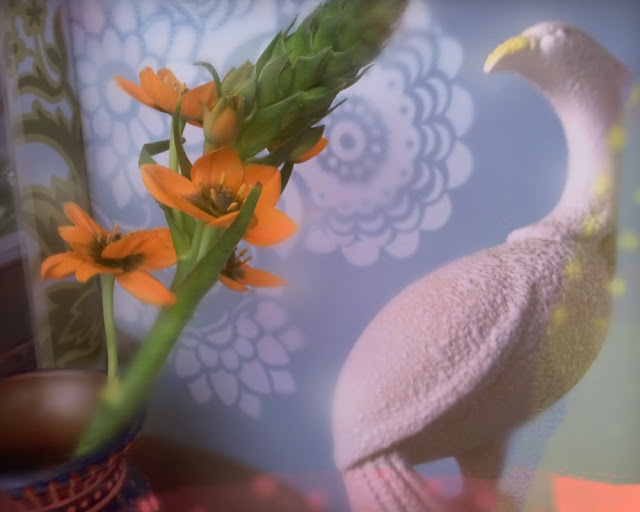Rumi is 13th century; obvious examples of earlier shifting images would include the Greek myths, brought into the new era by Ovid, whose description of Eleusinian cults were incipit to E. Darwin's scientific poems. A less obvious example of more contemporary poetry of transformation is in Rilke, though too inspired by ancient Greece: Every happiness is the child of a separation/ it did not think it could survive. And Daphne, becoming a laurel/ dares you to become the wind.
As briefly implied above, such narrative has been incorporated into evolutionary creationism. And to stop to consider why that school of thought is so fearful of the retrograde, it is assumed that the narrative beginnings of transformation are considered "primitive" for their association with tree worship, which is arguably missing today in our unhealthy environment.
Yet all men should be wary of stagnation and strive for growth, described by Neo-Platonists as working through the various stages of being. This is an example of a principle that many schools of thought should agree upon. Another benefit of transformation is the freeplay it presents to the mind; enough philosophers have described to the intellectually-inclined the importance of play in intellectual growth and discovery.

In Étrangers à nous-mêmes, Kristeva suggests Io might be the 'patron saint' of foreigners, which is a rather bleak idea if you ask me, and raises the question of where we are orienting our idea of change. While I would rather point it to progress than to turn back the dial - we are to move forwards despite our imperfections, the narrative of transformation is dangerously powerful: for here there is no point that does not see you. You must change your life. In this power, we grow wings, and can forget that Icarus, too, had those wings. Breugel's painting of his fall presents elements for contemplation: the plowed field in the shape of the Daedalian labyrinth: grounded. Which was the figurative and discerning path Daedalus indicated to his son.
There is a channel between voice and presence, A way where information flows. In disciplined silence the channel opens. With wandering talk, it closes, writes Rumi. Between wrongness and rightness. The distinction is conscious, personal, wakeful, thoughtful, emotional, physical, visual: the mindful compassion of the effective healer, for healing is also transformation. Not all transformation is equal - at the top of the post, Rumi writes of grief and loss. Like the original geographic confines of Europa - an obvious choice for a post also about change in form. Treasure is stored in ruined places. Reach your long hand out to ... beyond where you go on the street. There's a courage involved. We alchemists look for talent that can heat up and change. [In connection with alchemy, I think of Gustav Meyrink.]
To be so committed, to be willing to lose. Change in form is how we hold the subject with our mind and words. Rumi explains, "You're looking at the cup, whereas I think only of the wine I drink from that cup. If you gave me a chalice studded with gemstones, but filled with vinegar or something other than wine, what use would that be? An old broken dipper-gourd with wine in it is better than a hundred precious goblets full of other liquid." In this way, "The sciences and the arts and all branches of knowledge are inscriptions around the outside of the cups. When a cup shatters, the writing can no longer be read. The wine's the thing! The wine that's held in the mold of these physical cups."


No comments:
Post a Comment